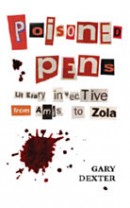 In his introduction to the wickedly fun Poisoned Pens: Literary Invective from Amis to Zola
In his introduction to the wickedly fun Poisoned Pens: Literary Invective from Amis to Zola, editor Gary Dexter gives three reasons why we should pay attention when writers write negatively about their peers:
Firstly, attacks by writers on other writers confirm our reasonable suspicions that some of the canonized masters have occasionally been over-rated by timid critics and snobs. . . .
Secondly, what is negative is, if nothing else, generally sincere. Good reports of fellow writers can easily be flattery or log-rolling: just think of the ways book-reviewers operate. . . .
Thirdly, writers often do their best work when they are attacking other writers.
Arranged chronologically, the book doesn’t waste its time with lightweights, or even middleweights. It begins with Aristophanes dissing Euripides, and near the end we find Samuel Beckett attacking himself. In between, Melville addresses Emerson’s “gaping flaw” in a letter to a friend: “It was, the insinuation, that had he lived in those days when the world was made, he might have offered some valuable suggestions. These men are all cracked right across the brow.”
George Bernard Shaw goes after the biggest game, taking a deep breath and spewing this about Shakespeare:
. . . his unbearable platitudes, his pretentious reduction of the subtlest problems of life to commonplaces against which a Polytechnic debating club would revolt, his incredible unsuggestiveness, his sententious combination of ready reflection with complete intellectual sterility, and his consequent incapacity for getting out of the depth of even the most ignorant audience, except when he solemnly says something so transcendently platitudinous that his more humble-minded hearers cannot bring themselves to believe that so great a man really meant to talk like their grandmothers.
Shaw goes on to say that he’d like to “dig [Shakespeare] up and throw stones at him.” This theme of exhume-and-assault recurs in Mark Twain’s opinion of Jane Austen, which I recently shared. Poisoned Pens also includes Twain’s hilarious criticism of James Fenimore Cooper’s conventions:
Another stage-property that he pulled out of his box pretty frequently was his broken twig. . . . Every time a Cooper person is in peril, and absolute silence is worth four dollars a minute, he is sure to step on a dry twig. There may be a hundred handier things to step on, but that wouldn’t satisfy Cooper. Cooper requires him to turn out and find a dry twig; and if he can’t do it, go and borrow one. In fact, the Leather Stocking Series ought to have been called the Broken Twig Series.
Later in the book, Faulkner and Orwell get their punches in on Twain. But Faulkner himself isn’t safe. (Clifton Fadiman on Absalom! Absalom!: “Apparently the entire population of Jefferson, Mississippi consists of rhetoricians who would blanch at the sight of a simple declarative sentence.”) And so it goes, the circle of gripe…

